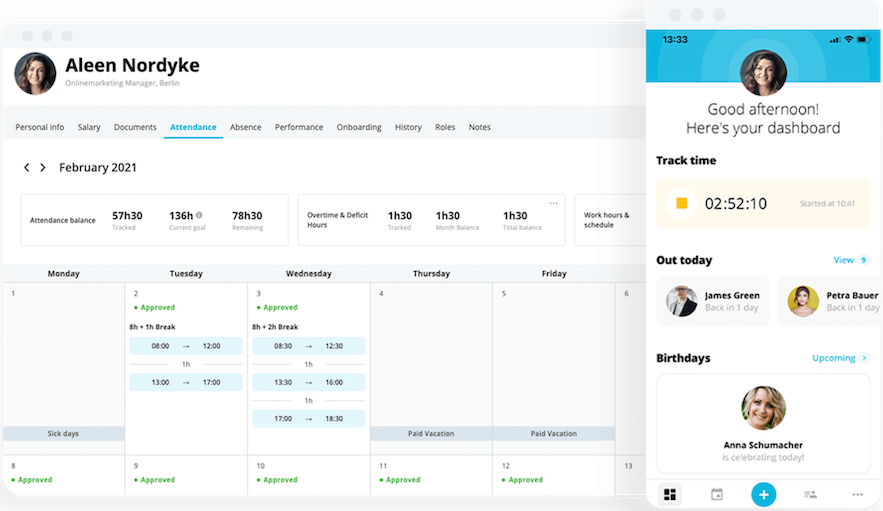13. June 2022
3 Groundbreaking HR Insights From H.U.G Digital 2022

What happens when you bring together the most inspiring minds in HR at one event? Well, at Europe’s biggest HR event H.U.G Digital 2022, fascinating insights emerged: from hiring trends and diversity to equal pay models and new approaches to strategic HR.
Missed it? In this article, we compiled the most pressing topics from the presentations, key moments from riveting discussions and the most inspiring food for thought from various workshops and talks.
Want to check out what you missed at H.U.G? Take a look at our free content library.Contents
- 1How HR Can Respond to the Labour Market ‘Storm’
- 2Insight 1: Winning Top Talent Has Changed Forever
- 3Employer Branding Has a Key Role to Play
- 4Diversity, Inclusion and Culture Are Drivers of Talent Acquisition
- 5Successful Recruiting Involves Improving Your People Experience
- 6Insight 2: Don’t Overlook Common Hybrid Work Issues
- 7What Does Fair Remuneration Look Like?
- 8How Can We Make Performance Management More Fair?
- 9How Do You Safeguard Your Culture in a Hybrid Environment?
- 10Insight 3: Upskilling and Reskilling Are Essential
- 115 Key Takeaways From H.U.G Digital 2022
How HR Can Respond to the Labour Market ‘Storm’
Although workshops, panels and keynote speeches at H.U.G Digital 2022 fanned out into a wide variety of topics, one narrative dominated – the dramatic change our labour market is currently undergoing. The fact is that qualified employees are fast becoming a scarce commodity.
Various presentations sketched out the labour market of the future while shedding light on the effects of the COVID-19 pandemic. Concepts like new forms of working emerged, while challenges were made to what we currently think of as the ‘norm’ (like the permanent employee model potentially losing importance).
Above all, what came up time and again was the change in values and new expectations among employees. Did you know, for example, that 65% of employees want employers to focus more on their personal wellbeing?
So the key question for the new age of HR is: How do companies position themselves in the future to attract and retain talent and remain successful in the long-term? The answer to this question revolves around employees, who should be the centre of all your HR activities.
Gain “Attraction Plus”: How to attract and retain employees post-pandemic.
The Top Topics at H.U.G Digital 2022
Plan your response to the changing candidate market:
How to hire the right talent faster:
Watch now: Strategies to increase hiring velocity and candidate retention
How your HR teams can work more strategically:
How to implement Diversity & Inclusion:
Watch now: Operationalising diversity, equity, and inclusion from the top down
How to counteract the shortage of skilled workers:
Watch now: How to create a fluid workforce to combat increasing talent shortages
Insight 1: Winning Top Talent Has Changed Forever
Diversity, inclusion, culture and the ability to reflect on our unconscious biases are now important HR topics because they influence your success with talent attraction.
Employer Branding Has a Key Role to Play
“The new capitalism is talentism,” says Katarina Berg, Chief Human Resources Officer at Spotify. Considering that 62% of all companies are currently struggling to hire the best candidates, this reinforces one thing: if you want to attract talent, you have to go beyond traditional employer branding activities.
She adds: “A lack of diversity in a company, for example, shows a lack of creativity, so for creative companies like Spotify, this is an important issue to attract talent.”
Diversity, Inclusion and Culture Are Drivers of Talent Acquisition
Of course, diversity is not just an issue of ‘branding’. Diversity is a driver of innovation and a crisis preparation, explains Tijen Onaran, founder of Global Digital Women. Diversity is an increasingly important requirement for employees when choosing their employer. As they can now choose any employer, it belongs at the top of the HR agenda.
In a world where employees feel increasingly disconnected, companies also need a strong culture that provides identity, belonging and meaning in order to attract and retain employees.
“HR managers and executives should use the time of change to transform the corporate culture and shape values in a new and inclusive way”, adds Asif Sadiq, Head of Diversity, Equity and Inclusion at Warner Bros. Discovery International.
Successful Recruiting Involves Improving Your People Experience
Hiring itself also needs more innovative thinking, says Asif: “Employers expect applicants to know everything about the company – but what about the other way around? Companies should try to get to know candidates on a human level and improve the candidate experience in the application process.”
Technology plays a decisive role here. It makes processes quicker and allows HR to concentrate more on working with candidates. Involving candidates, for example when they select suitable interview times on Calendly, also increases the speed of recruiting – and at the same time puts applicants on an equal footing.
People experience is becoming more critical. And, the topic of employee experience was absolutely everywhere at H.U.G Digital. So, we had our own announcement to make: To improve communication and interaction between employees and people teams, Personio has acquired the people experience platform Back. Find out how this will help your employees by reading this article.
Insight 2: Don’t Overlook Common Hybrid Work Issues
Think you’ve got your hybrid work strategy totally figured out? Then hold on tight, because the fact that a wave of widespread difficulties experienced by HR was discussed in detail at H.U.G Digital 2022:
What Does Fair Remuneration Look Like?
Salaries are usually set higher in big and expensive cities. So how do you ensure fair pay when some employees are now working remotely – one perhaps from expensive Zurich, the next perhaps inexpensively in the countryside? New ways of thinking and innovative salary bands are vital here.
Employee benefits also need to be revised and adapted to hybrid office strategies. Benefits such as the canteen, which can only be used on-site, are becoming less important. At the same time, things like wellbeing benefits that support employees in the challenging world of hybrid work are becoming more important.
How Can We Make Performance Management More Fair?
This is where another prejudice comes into play, namely proximity bias. This is the concept that employees who are more visible are considered to be better performers. Therefore, those who are in the office more often might be favoured over remote colleagues in performance conversations.
The so-called “halo effect” also plays into the hands of office workers: those who have once achieved an outstanding performance are automatically placed in the “performer” category later on. HR and managers need to be aware of this when making both performance and salary decisions.
What does equitable performance management look like? Download the guide now.
How Do You Safeguard Your Culture in a Hybrid Environment?
Hybrid working models are necessary, but if they are implemented poorly, they can wreak havoc with corporate culture, especially when it’s unclear how often you’re really supposed to be in the office. HR’s job is to communicate expectations clearly and transparently.
In a culture where not everyone is in the office every day, many encounters also fall away, such as random conversations at the coffee machine or a joke from a colleague in a meeting.
However, these random moments of connection or serendipity can also be deliberately created. How about playing a game of “trivia” with your teammates every now and then for ten minutes. This is possible from an online call, in-office or a mix of both.
Join Us Live at the Next H.U.G

Never miss great events like H.U.G again – subscribe to our Event Newsletter.
Sign Up For Event AlarmInsight 3: Upskilling and Reskilling Are Essential
And now for some good news – you don’t have to turn your entire recruiting process inside out to approach the shortage of skilled workers. There is another way, as Boom’s Chief People Officer Sophie Theen describes at H.U.G Digital.
For example, you can identify critical skill gaps by constantly measuring KPIs with the help of targeted performance development among your own employees. HR can then build a pipeline for important positions and keep valuable talent on board.
Let’s take a manager as an example. This is not about putting them on a leadership course, but creating the right environment for their development and facilitating new learning formats for them. Suitable ones may include:
Coaching to develop in-demand skills
Reverse coaching to pass on own knowledge
Peer coaching by colleagues
Self-study
Develop your employees now with seamless performance management from Personio.
Closely related to this is the strategy of reskilling. At DATEV, for example, a programme has been developed with which virtually every employee can develop into a “junior software engineer” in 12 to 18 months.
Here, too, a mixture of different formats is used, including:
An agile approach to learning packages
Learning coaches who accompany and motivate
Learning teams as well as self-directed learning
The side effect: not only are skill gaps effectively closed, the reskilling programme also has a positive impact on employee motivation and loyalty. In other words, it’s a win-win.
5 Key Takeaways From H.U.G Digital 2022
Key Takeaway 1: To ensure long-term success, companies must meet the expectations of their employees. Therefore, HR truly needs the time to take care of strategic tasks that boost employee recruitment and retention.
Key Takeaway 2: HR must create an awareness of and space for diversity – this also applies to recruiting. According to the similarity principle, we like to work with people who are similar to us. But it leads to innovation blocks if all employees think alike.
Key Takeaway 3: In recruiting, speed plays an increasingly important role – as does a positive experience for the applicant in the process.
Key Takeaway 4: Watch out for “hidden” hybrid work challenges. HR must now look at re-evaluating salary bands and benefits and ensuring fair performance reviews – whether an employee is remote, hybrid or office-based.
Key Takeaway 5: It is not only through an adapted recruiting strategy that skill gaps can be eliminated. New, important opportunities arise through the proactive development of talent and targeted reskilling.

